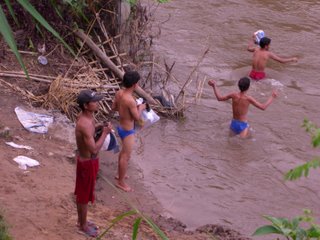 Thailand has been under the thumb of the junta for almost two weeks. On this blog I discussed some of the immediate changes brought about by the regime change. But what is it like for a country to sustain sixteen years of military rule? With that question in mind, I arrived at Mei Sae, a town on the Thai-Burma border.
Thailand has been under the thumb of the junta for almost two weeks. On this blog I discussed some of the immediate changes brought about by the regime change. But what is it like for a country to sustain sixteen years of military rule? With that question in mind, I arrived at Mei Sae, a town on the Thai-Burma border. The river is lined by guest houses and shops; central is the bridge -- a neutral territory occupied by begging children -- which spans two official checkpoints. The town on the Burmese side is Tachileik, undistinguished except for a pagoda and a casino built on its river bank.
I stopped at riverfront guesthouse for dinner. The manager told me sometimes Myanmar soldiers shoot people trying to swim across the river to Thailand. (I have tried to confirm this, but others residents dispute that swimmers get shot).
Going further up the river, I almost walked right past a small Thai army checkpoint. I spoke at some length with a Thai army sergeant, while a procession of Burmese on bicycles streamed past us. Some of the young men took a steep path to the river where they quickly stripped down to their underwear. Their clothes contained in clear plastic bags, they waded and then swam across the river. Past where we stood, the Burmese border extended over to our side of the river.
"Where's the border line?" I asked the sergeant.
"See that white dog?" Through the bushes I could see the animal sleeping. "That dog belongs to the Myanmar army."
The sergeant told me the Burmese were permitted stay on the Thai side for one day.
Suddenly, the sergeant looked at me quizzically. "Why are you interested in this?" Scowling, he pointed in the direction of the myriad border-crossers, "All this, it is so very low-so." Using Thai lingo, the sergeant wanted to know why a Westerner would have interest in the activities of low-society people.
Such direct expressions of contempt for the underprivileged may be rare, but the attitude behind such statements is a familiar one. The prevelance of this outlook is one reason I view the prospects of Thailand's coup d'etat with skepticism. Deposed, but democratically elected, Prime Minister Thaksin was no altruist. But he owed his popular mandate to successful initiatives like $1 per-visit-health care. Such policies won him the support of the rural poor. Thaksin's constituency was, from the vantage point of Bangkok's "high-so," decidedly "low-so."

No comments:
Post a Comment
Because all comments on this blog are moderated, there will be some delay before your comment is approved.